Dawb Yang Quotes in The Latehomecomer
For the adults, the stench and the humiliation of human waste were the worst part of that long week.

Unlock explanations and citation info for this and every other The Latehomecomer quote.
Plus so much more...
Get LitCharts A+I had never had brothers. I could not see any good changes that a boy would bring to my life. Still, if my father wanted one so badly, fine. I was too young to grasp the position that my mother was in.
It is many years from now. We are in America. The girls are grown and married. You and I—we are alone. First, you died. I did not live long without you. One day, I died in a silent house. There was nowhere to go. You were waiting for me. We wandered around, you and I. We walked in big American cities with loud cars and bright lights. Our spirits walked in lonely circles. How would we ever get back to the hills of Laos, the land of the ancestors?
On October 20, 1980, the St. Paul Dispatch published a story titled “Hostility Grows Toward Hmong.” On June 11, 1987, the headlines read similarly, “Hmong Gardens Vandalized for the Third Time This Spring.” My family arrived in July; we were just beginning. On the streets, sometimes people yelled for us to go home. Next to waves of hello, we received the middle finger.
Money was like a person I had never known or a wall I had never breached before: it kept me away from my grandma. I saw no way to climb this wall. Sometimes I thought so much about money that I couldn’t sleep. Money was not bills and coins or a check from welfare. In my imagination, it was much more: it was the nightmare that kept love apart in America.
My parents tried their best at English, but their best was not catching up with Dawb’s and mine. We were picking up the language faster, and so we became the interpreters and translators for our family dealings with American people. In the beginning, we just did it because it was easier and because we did not want to see them struggle over easy things. They were working hard for the more important things in our lives. Later, we realized so many other cousins and friends were doing the same.
Dawb, in her usual hurry to succeed, had enrolled in the post-secondary program at Hamline University: the parking situation was more affordable than the University of Minnesota. We didn’t talk about our dreams of the University. The choice became as simple as easier parking.

Dawb Yang Quotes in The Latehomecomer
For the adults, the stench and the humiliation of human waste were the worst part of that long week.

Unlock explanations and citation info for this and every other The Latehomecomer quote.
Plus so much more...
Get LitCharts A+I had never had brothers. I could not see any good changes that a boy would bring to my life. Still, if my father wanted one so badly, fine. I was too young to grasp the position that my mother was in.
It is many years from now. We are in America. The girls are grown and married. You and I—we are alone. First, you died. I did not live long without you. One day, I died in a silent house. There was nowhere to go. You were waiting for me. We wandered around, you and I. We walked in big American cities with loud cars and bright lights. Our spirits walked in lonely circles. How would we ever get back to the hills of Laos, the land of the ancestors?
On October 20, 1980, the St. Paul Dispatch published a story titled “Hostility Grows Toward Hmong.” On June 11, 1987, the headlines read similarly, “Hmong Gardens Vandalized for the Third Time This Spring.” My family arrived in July; we were just beginning. On the streets, sometimes people yelled for us to go home. Next to waves of hello, we received the middle finger.
Money was like a person I had never known or a wall I had never breached before: it kept me away from my grandma. I saw no way to climb this wall. Sometimes I thought so much about money that I couldn’t sleep. Money was not bills and coins or a check from welfare. In my imagination, it was much more: it was the nightmare that kept love apart in America.
My parents tried their best at English, but their best was not catching up with Dawb’s and mine. We were picking up the language faster, and so we became the interpreters and translators for our family dealings with American people. In the beginning, we just did it because it was easier and because we did not want to see them struggle over easy things. They were working hard for the more important things in our lives. Later, we realized so many other cousins and friends were doing the same.
Dawb, in her usual hurry to succeed, had enrolled in the post-secondary program at Hamline University: the parking situation was more affordable than the University of Minnesota. We didn’t talk about our dreams of the University. The choice became as simple as easier parking.











